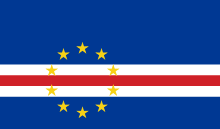Instituto Camões
| Founder | Government of Portugal |
|---|---|
| Type | Cultural institution |
Area served | Worldwide |
| Product | Portuguese cultural education |
| Website | Instituto Camões |
The Instituto Camões (English: Camões Institute) is an institution created in 1992 for the worldwide promotion of the Portuguese language and culture. The Instituto Camões has administrative and patrimonial autonomy, that, under the supervision of the Portuguese Minister of Foreign Affairs, assures the co-ordination and execution of the external cultural policies of Portugal.
Language centres
The Institute's Portuguese Language Centres (Centros de Língua Portuguesa or CLP) aim to promote the Portuguese language as well as co-operation with different countries in the field of education, including those where Portuguese is already spoken. This is in contrast to Spain's Instituto Cervantes, which is only represented in non-Spanish-speaking countries.
Locations
- Angola: Benguela, Lubango, and Luanda
- Argentina: Buenos Aires
- Austria: Vienna
- Belgium: Antwerp
- Brazil: São Paulo and Brasília
- Canada: Toronto
- Cape Verde: Praia
- China: Beijing and Shanghai
- Croatia: Zagreb
- Czech Republic: Prague
- East Timor: Dili (Instituto Português do Oriente)
- Estonia: Tallinn
- Ethiopia: Addis Ababa
- France: Lille, Lyon, and Poitiers
- Germany: Hamburg
- Guinea-Bissau: Bissau
- Hungary: Budapest
- India: Goa (Instituto Português do Oriente)
- Italy: Florence and Milan
- Macao: Macao (Instituto Português do Oriente)
- Moldova: Chisinau
- Morocco: Casablanca, Rabat
- Mexico: Mexico City
- Mozambique: Beira, Lichinga, Maputo, Nampula, Quelimane, and Xai-Xai
- Namibia: Windhoek
- Poland: Lublin
- Romania: Bucharest, Cluj-Napoca, and Constanta
- São Tomé and Príncipe: São Tomé
- Senegal: Dakar
- Serbia: Belgrade
- South Africa: Johannesburg
- South Korea: Pusan (Instituto Português do Oriente)
- Spain: Barcelona, Madrid, Cáceres, and Vigo
- Sweden: Stockholm
- Tunisia: Tunis
- United Kingdom: London, Edinburgh, Leeds, Newcastle and Oxford
- United States: Newark and Boston
- Venezuela: Caracas
New centres are presently being established in Paris and in the headquarters of the African Union in Addis Ababa and of the Economic Community of West African States in Abuja and in 2005, the towns of Canchungo, Ongoré, Mansôa, Bafatá, Gabú, Buba, Catió, Bolama, Bubaque, and Quinhamel in Guinea-Bissau to spread the fluency of Portuguese as the official language in the country.
Cultural centres
The Institute's Portuguese cultural centres (Centros culturais portugueses) are centres whose aim is the promotion of cultural relations between Portugal and other countries, including those with which Portugal has strong historical and cultural ties, and where Portuguese is already widely spoken. Like in language centres' counterparts, this is in contrast to Spain's Instituto Cervantes, which is only represented in non-Spanish-speaking countries.
Locations
 Angola (Luanda)
Angola (Luanda) Brazil (Brasília, São Paulo)
Brazil (Brasília, São Paulo) China (Beijing, Macau)
China (Beijing, Macau) Cape Verde (Praia, Mindelo)
Cape Verde (Praia, Mindelo) East Timor (Dili)
East Timor (Dili) France (Paris)
France (Paris) Guinea-Bissau (Bissau)
Guinea-Bissau (Bissau) India (New Delhi)
India (New Delhi) Japan (Tokyo)
Japan (Tokyo) Luxembourg (Luxembourg)
Luxembourg (Luxembourg) Morocco (Rabat, Casablanca)
Morocco (Rabat, Casablanca) Monaco (Monaco)
Monaco (Monaco) Mozambique (Maputo, Beira)
Mozambique (Maputo, Beira) São Tomé and Príncipe (São Tomé, Príncipe Island)
São Tomé and Príncipe (São Tomé, Príncipe Island) Spain (Vigo)
Spain (Vigo) Thailand (Bangkok)
Thailand (Bangkok)
There are also delegations in Berlin (Germany) and Brussels (Belgium).
Origin of the name
The Instituto Camões was named in honour of Luís de Camões, the best-known Portuguese author.
Recognition
In 2005, along with the Alliance française, the Società Dante Alighieri, the British Council, the Goethe-Institut, and the Instituto Cervantes, the Instituto Camões was awarded the Prince of Asturias Award for outstanding achievements in communications and the humanities.
External links
- (Portuguese) Instituto Camões